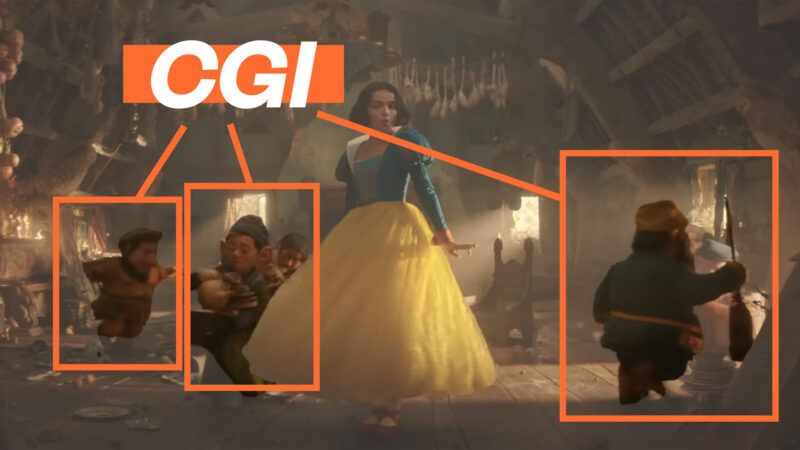Replacing the 7 Dwarfs in Snow White With CGI Is Not 'Progressive'
Disney said they wanted to "avoid reinforcing stereotypes." The company's solution was to take away roles from a group that has almost no opportunity in Hollywood.

Watching the new Snow White teaser trailer, which dropped last week, you'd be forgiven for being a bit confused. The live-action adaptation of the 1937 Disney cartoon still relies heavily on animation to fill out its cast. You'd also be forgiven for being confused by the reasoning.
In the trailer, we see Snow White, played by Rachel Zegler, twirling and making merry with her seven iconic companions, all of whom are portrayed with CGI. For those who've been following along over the course of production, that likely doesn't come as a surprise: Disney announced in early 2022 that the company would take a "different approach" to the septet of characters "to avoid reinforcing stereotypes" about dwarfs.
"It makes no sense to me," said the actor Peter Dinklage, himself a dwarf, on Marc Maron's podcast, prior to Disney's announcement. "You're progressive in one way"—casting a Latina as Snow White, he said—"but then you're still making that fucking backwards story about seven dwarfs living in a cave together. What the fuck are you doing, man?"
His objection quickly prompted Disney's response. The solution the company arrived at: replacing the characters with computer-generated renderings and declining to cast dwarf actors, who have next to no opportunity in Hollywood. That doesn't strike me as progressive.
Not everyone was thrilled. "It boggles my mind that a network, instead of listening to an entire community, [is] listening to one person," said Terra Jolé, a reality television star with dwarfism, who added that some of her family members auditioned for the film. "That's just how much pull this one person has created in this society because of where he is on the level of popularity."
Dinklage has indeed achieved a level of success that is rare for someone with dwarfism, gaining widespread recognition for his star turn in Game of Thrones. There are unfortunately a great deal fewer acting opportunities for those with the rare condition. Snow White was practically tailor-made to give the limelight to a group that has been systematically overlooked in casting. The rich irony is that those dreams were dashed at the behest of someone in their own community.
Do Dinklage's—and by extension Disney's—protestations against using dwarfs have merit? It's worth asking. Snow White's companions don't live "in a cave" as Dinklage suggests; they live in a picture-perfect cottage that looks like it was plucked straight out of a Bavarian village. But even if we were to accept Dinklage's characterization, Snow White is a fairy tale. It is fiction. It isn't real. That should be evidenced by the fact that, for example, Snow White's other closest confidants are the animals she meets in the forest. After watching the movie, I doubt I will come away with the impression that I could walk into the woods and befriend a deer, just as I wouldn't assume everything I saw about dwarfs mirrors the real world.
I'll no longer be confronted with the latter, because Disney reportedly refashioned the dwarfs as "magical creatures." Perhaps that's why this version has a truncated title; Snow White and the Seven Magical Creatures doesn't have quite the same ring. Whether or not the story will suffer remains to be seen, but one thing is clear: As is sometimes the case, in trying to signal virtue, Disney hurt the very people they were supposedly protecting.


Show Comments (152)